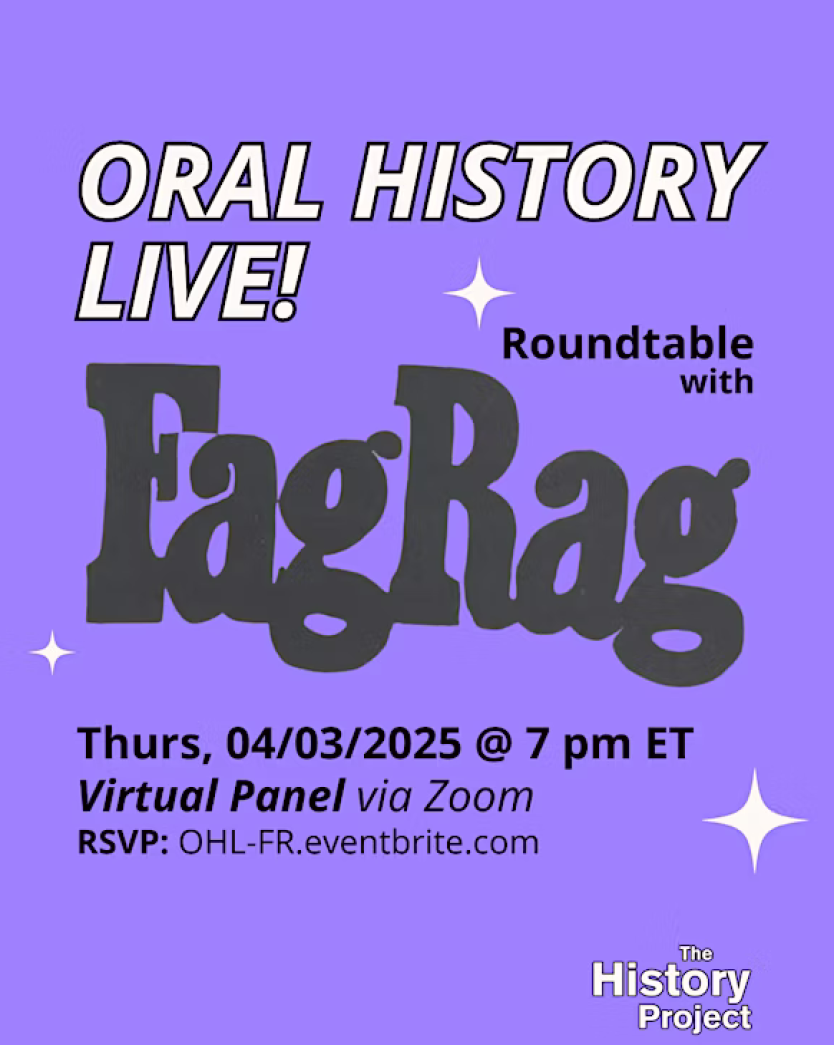🎤 Oral History Live! Roundtable with Fag Rag 🏳️🌈
📅 Thursday, April 3rd, 2025 | ⏰ 7:00 PM ET | 💻 Virtual Panel via Zoom
🔥 Before OutWeek, before ACT UP, before mainstream gay press—there was Fag Rag.
Fag Rag was the first of several national gay male cultural and political publications to emerge after the Stonewall Uprising of June 1969. Growing out of Boston’s Lavender Vision—a 1970 lesbian and gay male newspaper—Fag Rag published its first issue in June 1971 and its last in 1987. Over those sixteen years, it produced forty-four issues.
Run by an ever-changing collective—operating on anarchist principles—of leftist gay men, its lynchpin was Charley Shively, whose enormous dedication kept everything running. Fag Rag’s content was eclectic: poetry, photographs, fiction, plays, drawings, collages, memoirs, essays, and political analysis (what some now call theory). Its graphic design—post-Dada, pre-Punk, anarchic—was, for many, disorienting and even shocking.
Fag Rag was always at the forefront of radical queer social and political thought. It was often rude, shocking, combative, anti-authoritarian, explicitly sexual, and boundary-pushing. Every issue was a debate—often between members of the collective itself. Inevitably, it changed how gay men thought about their lives, influencing both the movement and the world.
Over the years, various collectives emerged from Fag Rag, founding the Boston Gay Review, Fag Rag Books, and Good Gay Poets press, which published some of the most important works of contemporary queer poets.
Join us for a live oral history roundtable with members of the Fag Rag collective as they revisit the magazine’s impact, legacy, and the battles they fought (and stirred up) along the way. Expect candid stories, unfiltered truths, and a glimpse into the raw, rebellious energy that fueled a movement.
🎟 Register now and be part of this queer history conversation!
✨ Why You’ll Love This Event:
📖 Hear firsthand from those who made Fag Rag a force of radical queer thought.
🔥 Unpack the legacy of this boundary-pushing queer publications in history.
💡 Learn how Fag Rag influenced today’s queer activism, literature, and politics.
🏳️🌈 Celebrate the power of queer voices—and the importance of keeping them alive.
🎟️ Your Ticket Makes a Difference
All ticket sales are donations that support The History Project’s mission to document, preserve, and share LGBTQ+ history in Boston. Recordings of our events are made publicly available on our free YouTube channel, ensuring these stories reach and inspire as many people as possible. Thank you for your generosity and support! ❤️

